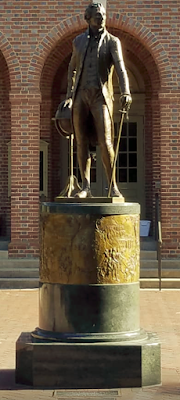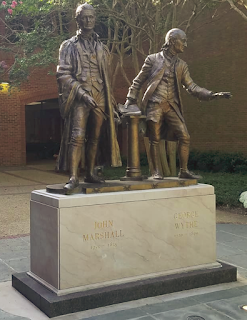In a recent tweet in anticipation of President Trump's nomination to fill the latest Supreme Court vacancy, Professor Laurence Tribe claims that overruling Roe v. Wade, 410 U.S. 113 (1972) would be a "two-sided coin" because it would both empower states to ban abortion but also authorize states to require individuals to abort an unborn child. Here is Tribe's tweet, which is no longer pinned to the top of his twitter feed:
“Too few people realize
that Roe v. Wade is a two-sided coin. It
protects a woman’s liberty to choose *whether or not* to bear a child. Relegating that choice to the state isn’t a
PRO-LIFE move but an ANTI-LIBERTY move.
If a state can say “stay pregnant!” it can also say “abort!”
At first glance, this
argument might have superficial appeal.
If Roe created a “liberty to
decide whether to give birth,” that liberty would presumably include both the liberty to abort an unborn child and the liberty to give birth. Hence, it would seem, repudiation of Roe would eliminate any constitutional
obstacles to a state requirement that pregnant women abort an unborn child.
Tribe's analysis is critically incomplete. Roe did more than recognize a
liberty to decide whether to give birth and thus a right to abort.
The Court also held that protection of the
unborn child (what the Court called "prenatal life") during the first two trimesters of pregnancy does not advance a compelling
state interest that justifies overriding this right. While the Court referred to the interest in "prenatal life" as "important and legitimate," it held that the state interest
in the unborn child’s life only becomes compelling when the child is capable of
surviving outside the womb, a period the Court equated with the third trimester of
pregnancy. See Roe, 410 U.S. at 162-63. During this third trimester, the Court said, a state can ban all abortion, "except when it is necessary to preserve the life or health of the mother." Id. at 163-64.
Thus, the modern Court could
jettison Roe in one
of two ways. First, it could (as Tribe
assumes) hold that the "liberty" declared in the 14th Amendment does not include the "liberty to decide whether to give birth," thereby thereby
freeing states to regulate childbearing as they saw fit. Second the Court could leave Roe’s definition of liberty entirely
intact, but hold, contrary to Roe, that
protection of "prenatal life" before viability does in fact serve a compelling
interest, as Justice Byron White explained over three decades ago. See Thornburgh v.
American College of Obstetricians, 476 U.S. 747, 795, n .3 (1986) (White, J. dissenting) (“The
point is that the specific interest the Court has recognized as compelling
after the point of viability — that is, the interest in protecting “potential
human life” — is present as well before viability, and the point of viability
seems to bear no discernible relationship to the strength of that
interest. Thus, there is no basis for
concluding that the essential character of the state interest becomes
transformed at the point of viability.”); id. at 795 ("The governmental interest at
issue here is in protecting those who will be citizens if their lives are not
ended in the womb. The substantiality of this interest is in no way dependent on the probability that the fetus may
be capable of surviving outside the womb at any given point in its development,
as the possibility of fetal survival is contingent on the state of medical
practice and technology, factors that are in essence morally and
constitutionally irrelevant. The State’s
interest is in the fetus as an entity in itself, and the character of this
entity does not change at the point of viability under conventional medical
wisdom. Accordingly the State’s
interest, if compelling after viability [as Roe
held], is equally compelling before viability."). Indeed, Justice Kennedy, who would later co-author the joint opinion in Planned Parenthood v. Casey, 505 U.S. 833 (1992), apparently agreed that Roe was erroneous in the first interest precisely because it held that protection of prenatal life before viability was not a compelling interest. See Webster v. Reproductive Health Services, 492 U.S. 490, 519 (1989) (Rehnquist, C.J., joined by White and Kennedy, JJ.) (“[W]e do not see why the State’s interest in protecting potential human life should come into existence only at the point of viability, and that there should therefore be a rigid line allowing state regulation after viability bur prohibiting it before viability.”).
This latter approach seems to this blogger to be the far more likely course, as it would follow naturally from the assertion by the Joint Opinion in Casey that any error in Roe would "go only to the strength of the state interest in fetal protection, not to the recognition afforded by the Constitution to the woman's liberty." See id. at 858 (opinion of O’Connor, Kennedy and Souter, JJ.); see also id. at 871 (“The weight to be given this state interest, not the strength of the woman’s interest, was the difficult question in Roe.”).
This latter approach seems to this blogger to be the far more likely course, as it would follow naturally from the assertion by the Joint Opinion in Casey that any error in Roe would "go only to the strength of the state interest in fetal protection, not to the recognition afforded by the Constitution to the woman's liberty." See id. at 858 (opinion of O’Connor, Kennedy and Souter, JJ.); see also id. at 871 (“The weight to be given this state interest, not the strength of the woman’s interest, was the difficult question in Roe.”).
To be sure, both
approaches would “overrule Roe,” in
the sense of restoring to the states the authority they possessed for nearly two centuries to restrict abortion. However, only the first approach
could conceivably leave states free to require a woman to abort an unborn
child. Under the second approach, by
contrast, a state ban on live birth would remain presumptively invalid, just as such a ban is presumptively invalid under the Roe/Casey regime. Indeed, such a ban would only survive
constitutional scrutiny (just as it would survive scrutiny under the current regime) if a state could identify an entirely different compelling state interest that somehow justified overriding the right to give birth. A state would also have to convince the Court that such a ban is narrowly tailored to advance that supposed compelling interest. This blogger is not aware of any compelling interest in state-mandated destruction of "prenatal life." In any event, and as already noted, such a compelling interest, if it exists, would also justify state-mandated abortion under the current Roe/Casey regime, with the result that the prospect of state-mandated abortion does not support a preference for the current regime over the second approach sketched above.
Whatever arguments there may be for retaining the Roe/Casey regime, the specter of state-forced abortion is not one of them.




